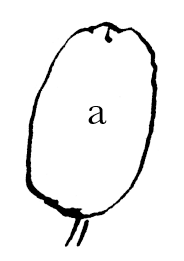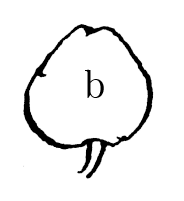From J. D. Hooker 11 March 1869
Royal Gardens Kew
March 11 /69.
Dear Darwin
That is a capital letter of Fritz Mueller’s, many thanks for it.—1
We were very glad to hear of you,—but this is bad news of Henrietta— give her our love, & best wishes for her recovery.2 I hope you are not anxious about her. I am delighted to hear of the Orchis-book, if that does not goad them into electing you to the Academy I do not know what will— I would not make many additions, it is very full as it is—3
As for me I am working like an “Injine” but not to much scientific purpose— Firstly I am threatened with being sent to St. Petersburgh by Govt. to represent British Botanists & Horticulturalists (God help them) at the approaching Congress which the Emperor has taken up.—4 I hate the sort of thing—but shall have to go.—about 12th May.— Consequently I am mugging up French as hard as I can, with a French Baron! for 2 hours from London who gives leçons on pronunciation,—with French novels with my wife, & French talk with the “spirituelle” Miss Symonds, who has been 10 days here & has captivated us entirely—5 Then I am working away at this British Flora,6 & lastly getting 3 months ahead with my current duties, with the view of extending my travels from St. Petersburgh for 2 months to the S.E. perhaps—& picking myself up somewhere.
Have you read Huxley upon Protoplasm?.7 & what do you think of it— I am on the look out for his G. Soc. Address, which Lyell says is “something of extraordinary” (you see I am getting on in French!)8
We are all well— no news of Willy yet— Charlie is launched at Marlborough & takes a good place, which he probably will not keep—9
We fertilized a large Aucuba 10 last year with the pollen of various varieties (or species) & there appear on the bush here & there, besides the common form of fruit
 , a few of another form
, a few of another form
 whose pollen was amongst that used There are none of intermediate form & b is still green, though all a is ripe I will try to have definite experiments made.
whose pollen was amongst that used There are none of intermediate form & b is still green, though all a is ripe I will try to have definite experiments made.
Ever yrs affec | J D Hooker
Footnotes
Bibliography
Correspondence: The correspondence of Charles Darwin. Edited by Frederick Burkhardt et al. 29 vols to date. Cambridge: Cambridge University Press. 1985–.
Hooker, Joseph Dalton. 1870. The student’s flora of the British Islands. London: Macmillan.
Mabberley, David J. 1997. The plant-book. A portable dictionary of the vascular plants. 2d edition. Cambridge: Cambridge University Press.
Orchids: On the various contrivances by which British and foreign orchids are fertilised by insects, and on the good effects of intercrossing. By Charles Darwin. London: John Murray. 1862.
Summary
Orchids translation should goad [French] Academy into electing CD.
JDH will be sent to St Petersburg congress by Government.
Huxley on protoplasm; his address to Geological Society.
Fertilised an Aucuba with pollen of various species. Reports on results.
Letter details
- Letter no.
- DCP-LETT-6655
- From
- Joseph Dalton Hooker
- To
- Charles Robert Darwin
- Sent from
- Kew
- Source of text
- DAR 103: 10–11
- Physical description
- ALS 4pp
Please cite as
Darwin Correspondence Project, “Letter no. 6655,” accessed on
Also published in The Correspondence of Charles Darwin, vol. 17


